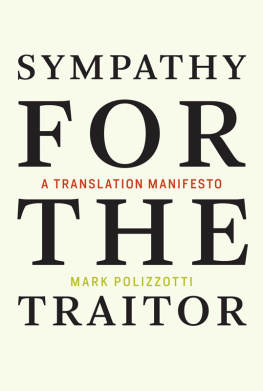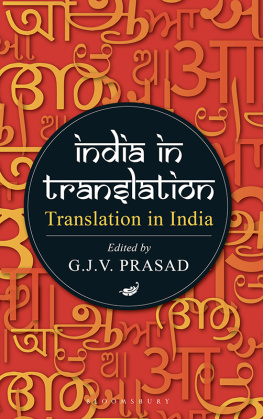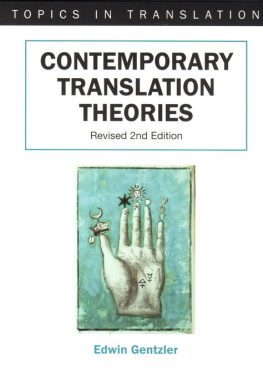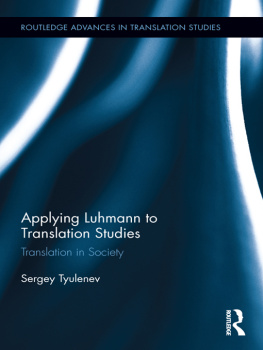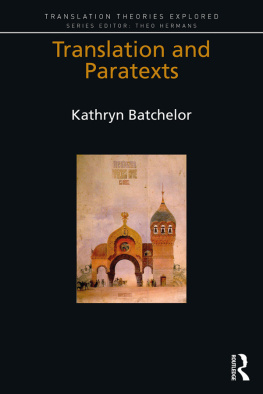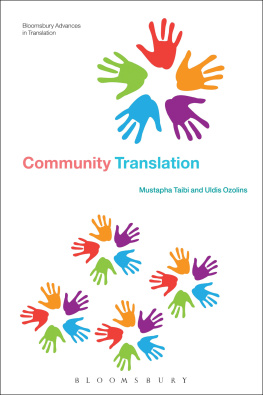Also by Mark Polizzotti
Lautramont Nomad
Revolution of the Mind: The Life of Andr Breton
The New Life: Poems
Los Olvidados
Bob Dylan: Highway 61 Revisited
Disordering My Library
As editor
Andr Breton: Selections
Rvolutions surralistes
They Knew What They Wanted: Poems and Collages by John Ashbery
Sympathy for the Traitor
A Translation Manifesto
Mark Polizzotti
The MIT Press
Cambridge, Massachusetts
London, England
2018 Mark Polizzotti
Portions of this book have previously appeared, in substantially different form, in the essays Traduced with Abandon: Translation and Its Malcontents (Parnassus 32, spring 2011), Sense and Serendipity: The Masochistic Art of Translating Surrealism (New Ohio Review 14, fall 2013), and The Translator's Responsibility (Translation Review 96, Oct. 2016). Grateful acknowledgment is made to the editors of these periodicals.
All rights reserved. No part of this book may be reproduced in any form by any electronic or mechanical means (including photocopying, recording, or information storage and retrieval) without permission in writing from the publisher.
This book was set in ITC Stone Serif Std by Toppan Best-set Premedia Limited. Printed and bound in the United States of America.
Library of Congress Cataloging-in-Publication Data is available.
ISBN: 978-0-262-03799-0
eISBN: 9780262346696
ePub Version 1.0
This is for Jacky
Acknowledgments
This book benefited from the exacting eyes of several early readers whose insights made it much better than it would have been, most notably Ben Downing, Jacky Colliss Harvey, William Rodarmor, Damion Searls, and Shelby Vincent. To them I express my profound gratitude.
My thanks to the editors of the periodicals that published early portions of what become these chapters: Herb Leibowitz of Parnassus, Jill Rosser of the New Ohio Review, and Rainer Schulte of Translation Review. I also thank Charles Hatfield, Associate Director of the Center for Translation Studies at the University of Texas, Dallas; Marilyn Kallet, Director of the Creative Writing Program at the University of Tennessee; and the poet and translator Clayton Eshleman, in his capacity as visiting professor at UCLA, for giving me a chance to road-test some of my ideas in their graduate seminars.
At MIT Press, I'm grateful to my editor and fellow translator Marc Lowenthal, who commissioned this book and has provided advice through its various stages, and to production editor Marcy Ross and copy editor David Hill for their help in bringing the text to its final form.
Various friends and colleagues have inspired me and helped shaped my thinking over the years with their writings, thoughts, guidance, and conversation, in particular Esther Allen, Harold Augenbraum, David Bellos, Rika Lesser, Ron Padgett, Trevor Winkfield, and Bill Zavatsky.
Thank you to my parents, Mario and Grace Polizzotti, for many years of support and encouragement; to my son, Alex Polizzotti, for enthusiastic curiosity about this project since the beginning; and to my partner, Jacky Colliss Harvey, for listening to its many iterations with consummate grace and much-needed reassurance.
Finally, I will always be indebted to Jean-Louis Bouttes and Maurice Roche, who (however inadvertently) first set me on the path of translation, one from which I've never looked back.
Introduction: Ground Rules
For some, translation is the poor cousin of literature, fool's gold or last resort, a necessary evil if not an outright travesty. For others, it is the royal road to cross-cultural understanding and literary enrichment. Translation skirts the boundaries between art and craft, originality and replication, altruism and commerce, even between genius and hack work. Vladimir Nabokov (himself a noted translator) tarred the pursuit as A parrot's screech, a monkey's chatter, / And profanation of the dead, while writers such as Ezra Pound, Samuel Beckett, Robert Lowell, Elizabeth Bishop, Kenneth Rexroth, Ted Hughes, John Ashbery, Lydia Davis, and Harry Mathewsnot to mention Charles Baudelaire, Jorge Luis Borges, Osip Mandelstam, Boris Pasternak, Paul Celan, Cesare Pavese, Yves Bonnefoy, Haruki Murakami, and Peter Handkehave produced translations that are literary marvels in their own right. At a time when the globe is just a mouse click away; when authors such as Roberto Bolao, Karl Ove Knausgaard, Patrick Modiano, Elena Ferrante, Stieg Larsson, Clarice Lispector, Umberto Eco, and Marguerite Duras, to name only a few, have staked important claims in the American literary landscape; and when translation is recognized as being ever more relevant, it is remarkable how many misconceptions still cling to it.
Rather than trying to provide definitive answerswhich I don't believe existI hope to bring the main questions into clearer focus: What is the ultimate goal of a translation? What does it mean to label a rendering faithful or unfaithful, and how useful are those criteria? What are the translator's ethical responsibilities toward the reader and toward the source text? Is something inevitably lost in translation, and can something also be gained? Can and should a translation ever improve upon the original? What makes some versions sing and others screech? And, ultimately, does translation matter, and if so, why does it matter?
There are many adequate histories of translation, and this brief study does not claim to be one of them, though I do devote one chapter to a very selective historical overview. Similarly, I am not concerned with adaptations of works into other media, such as The Great Gatsby resurfacing as a pop song or la recherche du temps perdu as a graphic novel. While there is an argument to be made for considering each of these a form of translationas does Roman Jakobson, for instanceit would also have led us away from my primary focus. Translation even in the strictly linguistic sense is complex enough.
As an additional disclaimer, I should note that those looking for a flashy new theory need not bother reading any further: there are plenty of them out there, from the prescriptive to the prohibitive (not to mention the plainly abstruse), and I don't intend to add to the noise. Consider this rather an antitheory, or perhaps just a common-sense approach. I'm aware that common sense isn't nearly as exciting as taking an extreme position. But having perused a number of extreme positions, I've found them not of much use when it comes to looking at what translation isor, as the translator David Bellos puts it, what it doesand many of them aren't even very exciting brain teasers.
My aim, instead, is to encourage you to think differently about translation, and to provide pointers on how to read not only translations per se but also the act of translation itself. Consider this book a manual and a manifestoan unabashedly opinionated examination of what translation is and isn't, and how it does or doesn't work, from a pragmatic, philosophical, historical, ethical, aspirational, performative, economic, practical, polemical, interrogative, and, I trust, resolutely unfashionable standpoint. To avoid confusion, I'll state at the outset that I derive most of my examples and problematics from the English-speaking world, usually North America, and that the word translation is primarily shorthand for literary translation, though I have also taken examples from other disciplines when appropriate. And while many instances come from my experience with French, the points they are illustrating are meant to apply to other languages as well.

